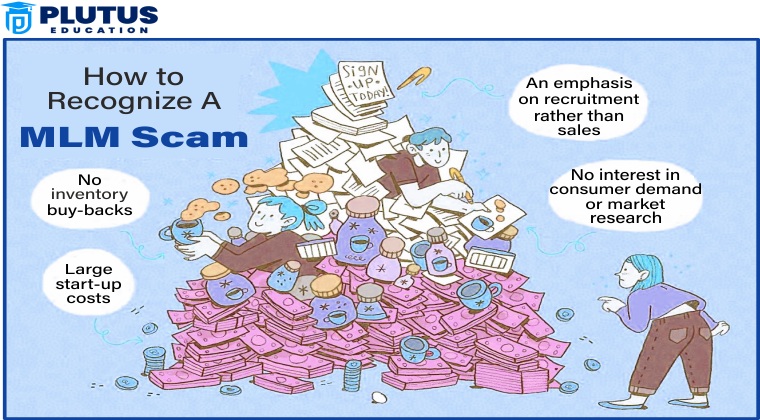MLM is a network marketing or pyramid selling, which, as a model, has praise and criticism everywhere around the globe. For the Indians, most of them associated MLM with fraud and scams due to its improper practices at some companies’ end. But, some are within lawful limits, whereas others wear different costumes to disguise themselves as respectable businesses while being schemes that prey on unsuspecting people due to their ability to trust in finance.
What Is Multilevel Marketing (MLM)?
In the multilevel marketing (MLM) system, a firm’s business approach depends on using distributors as channels of distribution in selling their product or service. Whereas, with a traditional form of retail, word-of-mouth advertising, personal selling, and even recruitment of others to form a team work for MLM expansion. MLM salespersons are, at the same time, organizers and form their own teams.
This business model revolves around two key elements: selling products and inviting new members to join the network. MLM distributors earn money through two channels:
- Direct Sales: Distributors sell the company’s products or services directly to customers.
- Team Commissions: Distributors earn bonuses based on the sales performance of their recruits.
MLM companies operate in various industries such as health and wellness, cosmetics, dietary supplements, and even financial services. The business provides a lot of earning potential, but it demands hard work, excellent marketing skills, and leadership abilities to succeed.
How Multilevel Marketing (MLM) Works?
MLM operates on a principle of multi-level distribution networks that sell products and recruit more people to their teams. This kind of network first aims to generate sales of products and, as a byproduct. Then, generate some income from building the team.
In MLM, distributors buy a starter kit that contains samples of the product, marketing materials, and training resources. They then sell the product to friends, family, and acquaintances and also invite other people to join the business.
Core Aspects of MLM
- Direct Selling Model: The first aspect of multi level marketing involves selling products directly to customers. Distributors act as the face of the brand, often promoting products through social media, personal connections, or one-on-one meetings. Many MLM companies offer high-quality, exclusive products that are not available in retail stores, making them unique.
- Team Building Model: The second aspect is recruitment. Distributors recruit others to join the business and form a team under them. These recruits are often called “downlines.” As downlines sell products and recruit their own teams, the distributor at the top earns a percentage of the total sales generated by their network. This structure creates a pyramid-shaped organization where earnings increase as the team grows.
MLM Scam and Its Appeal
The concept of Multi level Marketing is the selling of a product or service directly to a consumer through an extended network of distributors. They earn commissions based not only on their sales but also on those made by others whom they hired. MLM has the promise of financial independence, flexible work schedules, and a chance to create a passive stream of income.
However, the difference between legitimate MLM businesses and scams is often blurred. Scams focus more on recruitment than on selling products. This creates unsustainable structures where only a few at the top make a profit while the majority suffer losses.
The System of MLM Scam
MLM scams typically operate on the following principles:
- Initial Investment Need: New members need to pay a hefty fee to join. It is often framed as the cost of a “starter kit” or product package.
- Recruitment Focus: Members are incentivized to recruit others rather than sell products, creating a pyramid structure. Income is largely derived from recruit fees rather than actual product sales.
- Unsustainable Model: The pyramid grows until recruitment slows, causing the structure to collapse. Those at the bottom of the pyramid lose their investments.
- Deceptive Promises: Scammers lure victims with promises of quick wealth, luxury lifestyles, and minimal effort, masking the inherent risks.
MLM Scams in India
Several years have passed with high-profile MLM scams that defrauded thousands of people. These schemes are often disguised as legitimate businesses but exploit the trust and aspirations of individuals, and many people live in financial ruin.
Speak Asia Online
Speak Asia Online was one of the most notorious multilevel marketing scams in India. It involved an online survey for which many people were asked to pay a membership fee with the hope of getting much more in return. Investigations showed that it was a Ponzi scheme since it used contributions from newer members to pay off its older members. It eventually collapsed after slowing down recruiting members in 2011 with thousands of individuals left defrauded.
QNet
QNet, also known as QuestNet/Gold Quest/ QI Limited, has been involved in several controversies in India. Although it sells a range of products from wellness to fashion accessories, the authorities claim that its primary business is recruitment rather than selling products. QNet has been involved in several lawsuits, arrests, and bans in different states over the years. Victims often reported losing large sums of money after being forced to recruit friends and family.
Amway
Amway is a giant of MLM companies that have been accused of various unethical business practices across the globe. The investigation of the company took place in 2006 under the Prize Chits and Money Circulation Schemes (Banning) Act. But the case was dismissed. This brought about a much-needed debate over the ethical limits of MLM models and their effect on vulnerable groups.
Saradha Group
While not a classical MLM, the Saradha Group scandal speaks to how duplicitous financial scams exploit public trust. The company provided attractive investment opportunities in real estate, media, and tourism but collapsed in 2013, leaving thousands of people penniless. This case illustrates the convergence of Ponzi schemes and MLM-style recruitment structures.

Why MLM Scams Thrive in India?
MLM scams, exploiting India’s socio-economic aspirations and lack of financial literacy, are highly prevalent. They involve promises of ready money with the least effort, targeted at vulnerable populations looking for better financial avenues.
1. Lack of Awareness
Many people-especially in village areas simply unaware of many aspects of economics. These include many things about working MLM schemes and so are prime victims of cheaters who simply claim to mint money with the least effort.
2. Socioeconomic Aspirations
India’s emerging middle class thrives on expectations of a better lifestyle and a more secure life. MLM scams capitalize on aspirations, where people get to escape their current financial predicaments through seemingly legal opportunities.
3. Minimal Oversight
The complexity of MLM structures makes regulation and enforcement challenging. Fraudulent companies often exploit loopholes in existing laws to operate unchecked.
4. Psychological Manipulation
Scammers use high-pressure tactics, emotional appeals, and motivational rhetoric to recruit members. Victims are often persuaded to involve friends and family, creating a cycle of dependency and loss.
The Human Cost of MLM Scams
The fallout from MLM scams extends far beyond financial loss. Victims often face emotional distress, strained relationships, and social stigma. Many borrow money or deplete savings to join these schemes, leading to long-term financial instability. Moreover, the psychological impact of replicating can result in feelings of guilt, shame, and betrayal.
Regulatory Efforts in India
The Indian government has taken steps to curb the proliferation of MLM scams, including:
- The Prize Chits and Money Circulation Schemes (Banning) Act, 1978: This law restricts money circulation schemes and ensures penalties for violators.
- The Consumer Protection Act, 2019: The CP Act addresses unfair trade practices. Thus, providing a framework for protecting consumer rights.
- SEBI Investigations: The Securities and Exchange Board of India has played a crucial role in identifying and acting against fraudulent investment schemes linked to MLMs.
The Road Ahead
To combat MLM scams, India requires a multi-pronged approach that includes:
- Public Awareness Campaigns: Educating the masses about the risks and signs of scams.
- Stronger Regulations: Closing legal loopholes that allow fraudulent companies to thrive.
- Enhanced Oversight: Empowering authorities to investigate and penalize scams.
- Victim Support Systems: Providing financial and psychological support to those affected.
Conclusion
MLM scams represent a dark side of India’s economic aspirations, preying on the hopes of those seeking financial independence. While not all MLMs are fraudulent, the risks associated with these models demand caution and informed decision-making. By staying vigilant, educating oneself, and promoting awareness, individuals can protect themselves and others from falling victim to these schemes.
MLM Marketing Scam FAQs
What is the difference between a legitimate MLM and a pyramid scheme?
Legitimate MLMs focus on selling genuine products or services and offer earnings primarily through sales. Pyramid schemes, on the other hand, rely on recruitment fees, with little to no emphasis on product sales. Pyramid schemes are illegal and unsustainable, often collapsing when recruitment slows, leaving participants with financial losses.
Why do MLM scams thrive in India?
MLM scams thrive due to low financial literacy, socioeconomic aspirations, and limited regulatory enforcement. Many individuals are attracted by promises of quick wealth and fall prey to high-pressure recruitment tactics. Scammers exploit the lack of awareness and use deceptive practices to build trust and expand their networks.
Are MLMs legal in India?
Yes, MLMs are legal in India as long as they follow laws like the Prize Chits and Money Circulation Schemes (Banning) Act, of 1978. Companies must focus on product sales over recruitment and ensure transparent practices. Any MLM model operating like a pyramid scheme or money circulation scheme is illegal.
How can I identify an MLM scam?
Watch out for schemes emphasizing recruitment over product sales, requiring high upfront fees, or promising unrealistic returns. Lack of tangible products, opaque business models, and high-pressure tactics are also red flags. Always research the company thoroughly and consult experts if unsure about its legitimacy.
What legal actions can victims of MLM scams take?
Victims can file complaints under the Prize Chits and Money Circulation Schemes (Banning) Act or approach consumer courts for redressal. They can also report the scam to local law enforcement or regulatory bodies like SEBI. Seeking legal advice ensures appropriate action is taken against fraudulent companies.


